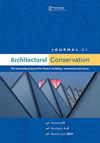Rethinking the conservation of Afro-Brazilian mosque legacy
IF 0.5
3区 艺术学
0 ARCHITECTURE
引用次数: 7
Abstract
ABSTRACT The focus of this paper is the state of conservation of the Afro-Brazilian mosques in Yorubaland in Nigeria. These mosques signify a symbolic moment in West Africa’s architectural history as a cross-fertilization of Luso-Brazilian architectural elements with West African Islamic architectural traditions. Their architectural characteristics have been described based on extensive fieldwork in Yorubaland, during which they have been identified, located and documented. By utilizing physical observations, anecdotal evidence, and secondary literature, the paper categorizes the Afro-Brazilian mosques according to their typological and morphologic characteristics and identifies their heritage values. Their significance is highlighted as the evidence of cross-fertilization of imported and local architectural ideas as well as the negotiation of the indigenes with this imported architecture and its implications for urban memory. After addressing the conservation problems concerning the legacy of Afro-Brazilian mosques, the paper finally recommends a way forward for mobilizing action in response to their deterioration and loss.重新思考非裔巴西清真寺遗产的保护
摘要本文的重点是尼日利亚约鲁巴兰的非裔巴西清真寺的保护状况。这些清真寺象征着西非建筑史上的一个象征性时刻,是卢索-巴西建筑元素与西非伊斯兰建筑传统的交叉融合。它们的建筑特征是根据在约鲁巴兰的广泛实地调查而描述的,在此期间,它们被识别、定位和记录下来。利用物理观察、轶事证据和二手文献,根据非裔巴西清真寺的类型学和形态学特征对其进行了分类,并确定了其遗产价值。它们的重要性被强调为外来建筑和本地建筑思想的交叉融合的证据,以及土著人与这种外来建筑的谈判及其对城市记忆的影响。在解决了与非裔巴西清真寺遗产有关的保护问题后,该文件最后建议了动员行动应对其恶化和损失的前进道路。
本文章由计算机程序翻译,如有差异,请以英文原文为准。
求助全文
约1分钟内获得全文
求助全文

 求助内容:
求助内容: 应助结果提醒方式:
应助结果提醒方式:


